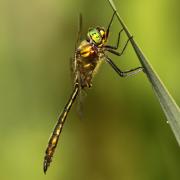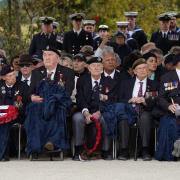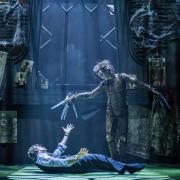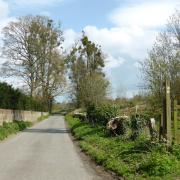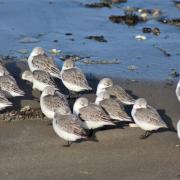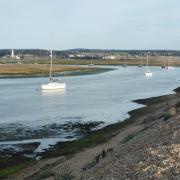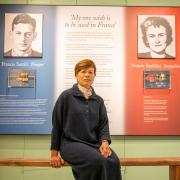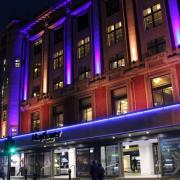With his bold portraits, Portsmouth artist Karl Rudziak has the potential to dilute prejudices and re-evaluate attitudes in a city that doesn’t need culture

Karl Rudziak is judgemental. He has, within minutes of our interview, confessed to making assumptions about the people he meets, feigning knowledge based on their peripheral layers of personal presentation and clothing choices.
Yet he is such an affable and thought provoking artist with an easy going manner that includes an inclination to avoid taking himself too seriously, I wonder if his admission really merits such alarm. For which of us isn’t guilty of similar, superficial conjecture, if only occasionally, and at a subliminal level?
More importantly, Karl is not only aware of his transgression, he is determined to address, and indeed harness, this characteristic - hence his investment in a lengthy acquaintance with each artistic subject, enabling him to capture the essence of a person on canvas.
“My portraits begin when people start talking about themselves. Painting is the technical bit at the end,” he remarks.
In his studio at the top of a town house in Portsmouth, I soon learn how crucial this painter-subject interaction is for Karl.
“Likeness is the catalyst that pulls you in, so the person I’m painting has to recognise themselves. It’s a little intrusive but people need to open up. That’s done through trust and I would never betray that. Everybody has a story to tell.”

With sunlight filtering through a large window, and numerous oil paintings vying for space dominated by an extraordinarily tall easel made by his father, we are soon discussing culture and the determination this artist has to influence perceptions via his own mission.
“Any city benefits from a cultural hub. Business and growth sit on top of a creative environment. My ‘We Don’t Need Culture’ project is about appealing to people who don’t see the value of galleries and theatre. Portsmouth is a working class city, and the Arts are marginalised around the outside - but I want my art to reflect the people of this city and benefit the community. As an artist, I’m not here to patronise, I just want to talk to people then create artefacts and hope they will engage. You can have conversations about culture without realising it, and I’m trying to do it in a non-patronising way. There’s a tangible outcome by investing in the Arts.”
Karl’s passion is equally tangible. The connection between him, his art and the environment is self generating. He loves being surprised by people, this interest being at the core of his work.
“When we create pictures they have to say something, and the best subjects are people - they are forever changing.”
If he wasn’t an artist, the 50 year old would make an excellent sociology tutor such is his fascination with human behaviour. He is committed to questioning himself, unmoved by other people’s opinions of him, and appreciates the directness of Pompey locals. Age may bring experience but, he asserts, your knowledge base is never complete or fixed.
Casual this attitude might be, but a determined focus on minutiae kicks in when creating a painting.

“I’m obsessed with detail so my camera is a reference point. I might take about 200 shots then, as I flick through one or two, I go bang and that’s the one. Then it’s straight to canvas. I lay down a single toned, mono picture of the face and get everything in the right place. I try to get lights and darks in first, then slowly add colour – neutrals for skin tone and then highlights to get a sense of depth.”
Large, square canvases are favoured and, although some paintings can take up to nine months to complete, “I usually nail it within days.”
How challenging is it to identify the point at which a painting is complete?
“It’s a discipline I’ve taught myself. I have to let go. It’s all about the face - the eyes tell you, once they have that look. Too much detail saturates the picture.”
After training at the Portsmouth College of Art, Karl spent much of his twenties playing in a band. With an unfulfilling day job at a printing company, it took the milestone of his 30th birthday and a BA from the University of Portsmouth to change his career.
“Practice informs you, and that made me think about what I could do as an artist. Once I started to work it took over my life.”

One of the most iconic images in Karl’s portfolio, one which has been exhibited at The National Portrait Gallery as part of the BP Awards, is John Portsmouth Football Club Westwood. That the imposing image is memorable is never in doubt. Given the artist’s mindset, indeed, it almost demands the viewer to experience a degree of discomfort. Yet isn’t he also daring us? For who are we to make assumptions, projecting our own personal standards onto someone we don’t know?
Such questions prompt further analysis of the image. And then I take a closer look at other portraits and quickly appreciate the significance placed on facial features. I had wondered if Karl downgraded the rest of an image in favour of the eyes. But that hardly crosses my mind, lured as I am to the gaze of each of his sitters.
The Local Government Officer is a fine example - The Student too. One of the most enjoyable aspects of art is observing a subject, taking in detail and nuances, even guessing at what led to the sitting. But there’s much more involved here. Almost as strong as the image is a sense that each subject is staring back, scrutinising the periphery of the onlooker’s garments, expression and intentions and then using those details to deduce persona. More importantly, perhaps ironically, each subject dares the viewer to make a judgement about them. It is an intense exchange rather than a one way transaction, and this paradox makes both artist and paintings so intriguing. For Karl’s paintings are catalysts. By looking at people we believe we know them. These images, however, challenge us to continue our judgement when we, in turn, are being similarly judged. In so doing they create conversation and spark debate about our perception of each other and our predisposition to project our own personal values onto others.
This artist’s work has the potential to dilute prejudices and re-evaluate attitudes. We Don’t Need Culture is supported by Portsmouth Cultural Trust and Portsmouth Council, and when the initial portraits are exhibited in the Community Hub, they will provide the city with a unique opportunity to witness the talents of a local painter, as well as engage with each other in a spirit of open mindedness.
Karl Rudziak’s creative skills make him a respected figure in the art world, but his social comment is surely as influential as his canvasses.

Find out more by visiting www.karl.rudziak.co.uk
***
READ ON
• Marsha Swanzy on running her own Whitchurch clothing boutique - Marsha Swanzy has had job offers from Vivien Westwood and Liberty & Co, but she shunned them all to run her own clothing boutique in Whitchurch… Jane Gazzard went to meet her to find out if she made the right choice
• Winchester artist Jenny Muncaster on creating eye-catching art and having Raymond Blanc as a fan - Jenny Muncaster uses her love of food to create eye-catching and mouth-watering art - and Raymond Blanc is a fan




